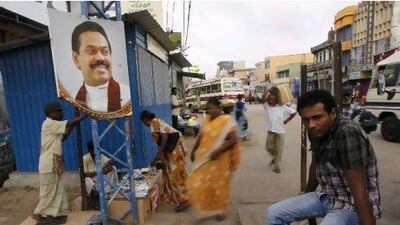COLOMBO // The roadblocks have been dismantled, the sandbags removed, and Sri Lanka is again a palm-fringed tourist paradise, the government says.
But for Tamils living in the former war zone, it is still a nightmare of haunted memories, military occupation and missing loved ones.
Hundreds of thousands remain homeless, and no effort has been made to reunite families separated two years ago during the final months of the war between the defeated Tamil separatists and the Sinhalese-dominated government.
A power-sharing programme that President Mahinda Rajapaksa promised to enact after the 26-year war has gone nowhere. The International Crisis Group, a Brussels-based non-governmental organisation that works to prevent and resolve deadly conflict, castigated the government in a July report that said "the country is yet to see any semblance of compromise or inclusiveness".
In the meantime, the government has worked hard to project an image of peace and redemption. It insists Tamils have embraced its plan to rebuild homes and shattered lives. It is playing up the Indian Ocean island's reputation as a tourist destination, building airports, seaports and roads. It has even ordered an army headquarters to be converted into a beachside hotel.
But in the ethnic Tamil heartland in the north, resentment has been building. From the school where he sleeps, principal Asirvatham Soosainathar watches the troops who are still living in his house in the village of Murikandy. On weekends, he visits his family in the home they have rented 80 kilometres away.
More than 100 families in the village were displaced by troops and the government has promised to return their homes. But in two years, Mr Soosainathar said he had seen no evidence of it.
"I have 106 coconut trees on my land, but nowadays I have to pay for my coconut," Mr Soosainathar, 44, said. "The army has been telling me for two years that it will leave my house, but they are still cultivating my land."
Many Tamils fear that the soldiers in their homes are the vanguard of a government plan to send Sinhalese settlers into their area to dilute Tamil power and prevent any new push for a separate homeland for the minority. Tamil legislators say the military is seizing land that was in private hands before the war.
"The army is doing everything to be there permanently," said Suresh Premachandran, of the Tamil National Alliance. "They are putting up permanent camps, cantonments and, of course, they are very much part of the entire administrative system in the northern province."
Electricity has been restored and roads repaired. Supermarkets, banks and internet cafes have opened outlets in areas closed to business during the war.
But many people whose homes were destroyed continue to live under tents or in huts covered only by tin sheets. On the other hand, military camps have mushroomed and monuments have been erected to honour the fallen soldiers. The army also runs roadside restaurants catering to Sinhalese tourists who have flocked to see areas recaptured from the rebels.
Ahead of elections in the north last month, the government painted the polls as a referendum on its reconciliation efforts. But the ruling coalition was crushed, and Tamil politicians in favour of self-determination won 20 of 25 seats on local councils. The government insists it is pursuing reconciliation and taking care of victims.
"Rapid resettlement and economic empowerment is taking place ... though obviously much more needs to be done," said Rajiva Wijesinha, a politician and adviser to Mr Rajapaksa. He denied that the military was taking over private land, and said it would pay compensation for any land it acquires.
Ananthi, a mother of three, is still searching for her husband, Sinnathurai Sasitharan, a political leader for the Tamil Tigers who she last saw being escorted away by the military after surrendering on May 18, 2009.
"He was not going to surrender. He wanted to send me off and commit suicide by swallowing cyanide," she said. "But I cried and begged him to surrender so that he could live the rest of his life for his family."
The whereabouts of her husband, known by the nom de guerre Elilan, and scores of other rebels who mounted the last stand, as well as a Catholic priest who mediated their surrender, were unknown, she said.
Though the government announced that it had rehabilitated many of the 11,000 rebels it captured, the relatives of many rebel fighters last seen accompanied by soldiers say they have never been told the whereabouts of their loved ones. Families have searched in hospitals, camps and detention centres.
The Tamil Tigers, long seen as one of the world's most effective and brutal insurgent groups, had fought to create an independent state for ethnic minority Tamils after decades of marginalisation by governments controlled by the Sinhalese majority.
The militants, who ran a de facto state in the north, sent suicide bombers into train stations, while the military was accused of shelling civilians and hospitals in the war zone.
A UN expert panel report in April accused both sides of potential war crimes and recommended an independent international inquiry.
The government has denied the accusations, though it did acknowledge for the first time last week that some civilians were killed in the final offensive in 2009. The UN panel has said tens of thousands of civilians were killed in that offensive.

